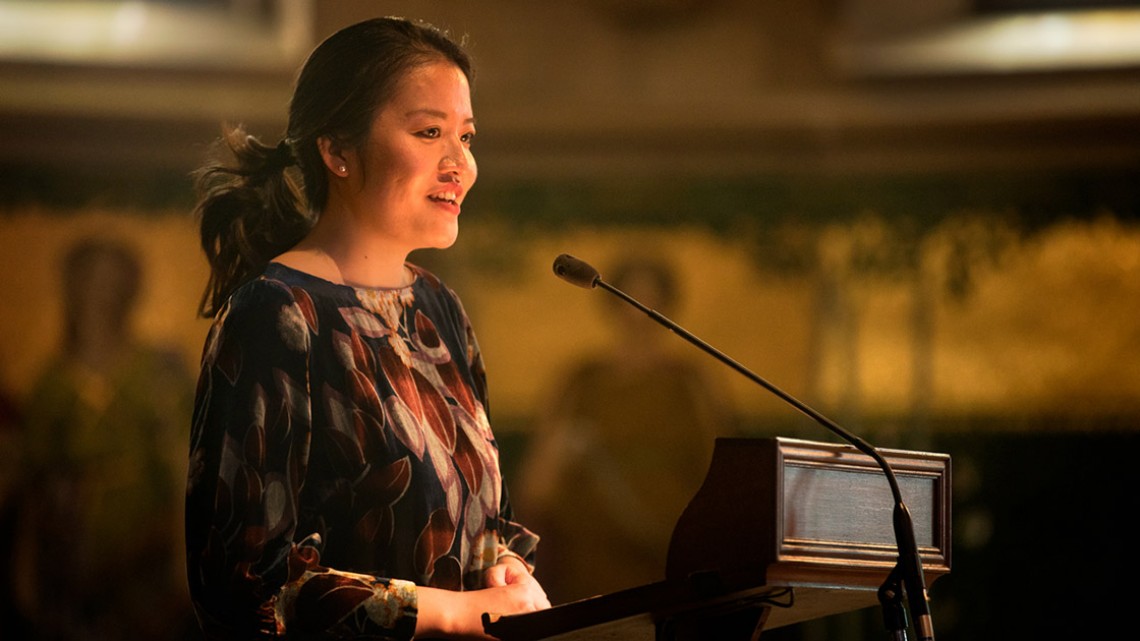
Grace Chuang, a senior at Cornell majoring in chemical engineering, spoke at Soup and Hope on March 15.
Student uses storytelling to find herself and just ‘be’
By Nancy Doolittle
The ability to “live in her head” – always thinking, always reflecting, always framing the present in an image or a story – has served chemical engineering student Grace Chuang ’18 well in her filmmaking and storytelling passions and in her ability to envision the “what-ifs” that propel discovery.
But when she started to prepare for her March 15 talk for Soup & Hope in Sage Chapel, that ability worked against her, surfacing fears and doubts, summoning her inner critic and creating writer’s block. She worked through it by reflecting on what her four years at Cornell have taught her: that her mind is “also a brilliant, kind place, capable of dreaming and inventing and loving.” She is grateful for people at Cornell who’ve pushed her to share what is in her head through storytelling, and for what she has learned about the need to just “be.”
In the fall of 2016, Chuang co-created “Untold,” an interactive art exhibit at the Herbert F. Johnson Museum of Art that shared the stories of 18 people in the Ithaca community through photographs and audio. Driven by compassion and a dream that they could show people how much they were valued, connect with people different from themselves, and inspire others to do the same, Chuang and four other engineering students spoke to the homeless, elderly, refugees, students and other members of the Ithaca community.
They took photographs of the interviewees’ hands and edited each interview down to a short audio recording. For the exhibit, they positioned lecterns and iPads containing the stories of each interviewee around the room, hanging their enlarged photographs on the walls. More than 300 people attended the exhibit’s opening night.
“That entire night, I stood in the middle of the room, and I could hardly breathe, because everything that had been in my head for seven months was being plastered on four walls,” Chuang said. “Hundreds of people stood there listening to stories, but it felt like they weren’t looking at the photographs … they were peering deep into my soul and looking at me. I had never felt so vulnerable in my life, but it had also never felt so right.”
Chuang experienced a similar moment the next year, in the summer of 2017. She had been awarded a Kessler fellowship, which, in part, gave her funding to spend a summer working in a startup company. She chose a film agency and created a short personal film that captured times of conflicting emotions and gratitude for simply being alive. At the film’s premiere, Chuang looked around at the audience that was laughing and crying at the same time, and she knew that “something special had happened in that room.”
From these two experiences, Chuang learned how liberating it can be “to put out in the universe what has been living in your head.” For Chuang, “hope” is too weak a word for that sense of liberation.
“When I hope, I waste too much time wishing I could be a better daughter, sister student, engineer, artist, storyteller, roommate and friend,” Chuang said. “I think the word ‘be’ is better. … Be the person you want to be, say the things you want to say, and do the things you want to do. … I am forever grateful for these four years at Cornell, and the platform I have been given to break boundaries, create, inspire and simply be.”
Media Contact
Get Cornell news delivered right to your inbox.
Subscribe
